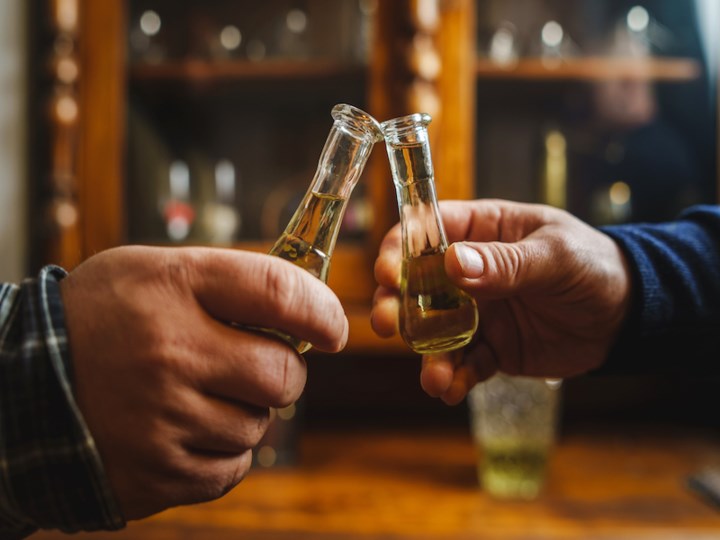If you have booked
one of our villas with pool, you should be prepared for one thing:
A
“rakija” or homemade liqueur, which is usually offered by the friendly hosts of the villas, to give you a warm welcome and to toast a successful holiday.
What most of you should be familiar with is
sliwowitz or sljivovica, which is
made from plums. But watch out! Rakija is made by distilling fermented fruits and can contain
between 40 and 60% alcohol, sometimes more with homemade schnapps. If you are not used to alcohol, you should enjoy rakija moderately. Their beneficial effects can also quickly go to your head. ;-)

But rakija is not just a brandy.
Rakija is medicine! It has healing, antibacterial and warming effects. If you believe the locals, it doesn't matter whether it's wounds, tooth or joint pain, lovesickness or stress ... rakija simply helps against everything.
Of course, rakija is also a good companion on festive occasions, to conclude good deals or during difficult negotiations. Everything is more relaxed and a little friendlier. Rakija is therefore almost
automatically associated with the hospitality and sociability of the Croatian people. She belongs to every congregation!
But back to your vacation ... If the host now offers you a
Travarica, it also
contains medicinal herbs in addition to the wine distillate. These are mostly typical Dalmatian medicinal and herbal plants such as sage, rosemary, mint, lavender, fennel and rose plants. Most of the time, this schnapps is served from a bottle containing branches of the appropriate plant to emphasise the healing properties. So who can say no to that?
In
Dalmatia, Loza or Lozovaca, a strong brandy
made from grapes, is also often served. Mostly, Loza is crystal clear and will
remind you of grappa or vodka. Sometimes, however, aromatic grasses, honey, hazelnuts, etc. are also added, which can then also change the color. If you happen to be invited to a game of boccia while taking a walk during your vacation, there is a very good chance that you will have met the Lozovaca at the end of the trip. :-)
 Medica, a schnapps with honey
Medica, a schnapps with honey (Croatian: “med”), is often offered in
Istria and the
continental parts of Croatia as an aperitif or digestif. Or also for in between. ;-) The sweet and rather mild taste can be deceptive and tempts to drink another glass, but then unfolds its effect surprisingly.
In terms of popularity and quality,
Croatian liqueurs are in no way inferior to rakija. They are often served with a great meal, where they round off the dessert.
If you have booked one of our villas in
Istria, then take the opportunity to try the
Terranino. This is a
red wine liqueur made from the
Terrano grape variety, which predominantly thrives in Istria. The wine, but also the liqueur, go best with a platter of Istrian ham and cheese and a cozy afternoon chat with your best friends.
Pelinkovac, a vermouth liqueur, should not be missing in any Croatian household. This “national drink” is known for its bitter taste and is often served with ice cubes and a slice of lemon. Pelinkovac is best imagined at a game of poker or skat with friends.

You can also try
Kruskovac, the
Croatian pear liqueur that is often served on festive occasions. Because of its sweetness and mild taste, it is easy to drink and is preferred by women. However, the
alcohol content of around 28% should not be forgotten. The orange-gold color is particularly alluring.
Orahovac is a nut liqueur made of the green fruits of the walnut. Accordingly, its taste is a bit bitter. It is said to help with digestive problems and heartburn. Orahovac can also be used excellently as an ingredient in cocktails and is also a popular companion to coffee and cake.

Let yourself be seduced and discover the rakijas and liqueurs of Croatia. No matter what effect they are said to have, you can be certain of one effect: each of these drinks turns acquaintances into friends. Enjoy it!
Daniela Vuleta
11.11.2021

 MY ISTRIA GUIDE
MY ISTRIA GUIDE




